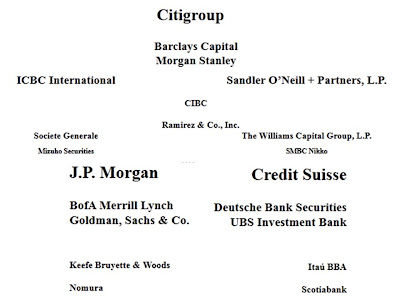Ghana Business News reported:
The Board of the African Development Bank (AfDB) has approved an equity investment of $50 million into the Carlyle sub-Saharan Africa Fund, a statement from the Bank March 2, 2012 has said.
“The Carlyle Fund will balance our equity portfolio to allow additional investments in riskier market segments,” said Tim Turner, Director, AfDB Private Sector operations.
Two years ago the African Development Bank
allocated $50 million to Bob Geldorf's 8 Miles Fund. Geldorf minimizes the greed side of private equity, as does Carlyle. The African Development Bank's press release stated:.
AfDB has helped Carlyle establish a fully-fledged environmental and social management system, and a development outcomes tracking system, to monitor job creation, tax revenues and incremental capital flows to portfolio companies.
Africa is the perfect place to make private equity underwriters
look like job creators. Carlyle co-founder David Rubenstein said this in 2010:
"I am very bullish on the prospects for Africa. Nothing compares with Africa in terms of economic growth as a percentage over the next decade, [partly because] it is starting from a low base."
Will the African Development Bank monitor management fees, the impact of greatly increased interest costs on tax payments, and special dividends/distributions, especially those funded by debt? Will the African Development Bank share their insider information, as Carlyle investors, with the general public?
Who will watch capital flows from portfolio companies? The African Development Bank is in a unique position to do so with Carlyle and 8 Miles.
AfDB and Carlyle will also jointly launch the “In-the-Board-Room” programme, an audio series targeted at African business students. The programme will provide more than 1,000 African business students with access to messages on inspirational leadership, a sense of strategic command and lessons in crisis management.
I suggest Carlyle start with the following real life examples:
Crisis Management - LifeCare Hospital of New Orleans, August 2005, Hurricane Katrina. LifeCare's
25 patient deaths warranted
not one mention in the Bush
Lessons Learned report authored by Frances Townsend. Crisis management in this case
had zero to do with good disaster management.
Strategic Command - Options include
SemGroup's bankruptcy, due to $2.4 billion in bad energy bets, or Vought Aircraft's
gunking up Boeing
Dreamliner production due to "liquidity constraints."
Inspirational Leadership - Choose between Carlyle Capital Corporation's failure and subsequent
hand washing or Carlyle's debt cramdown of Brintons' and pension plan
dump on the British public.
Let's hope they teach African business students to view the whole picture.
PEU Report is always open to those interested in how Carlyle & company operate. Carlyle is already in Angolan
offshore oil, Nigeria as
partner with PENCOM and Mauritius via multiple
investment offerings, now up to
Carlyle Mauritius III.
Business students, start
your research!
Carlyle can dress up portfolio companies as socially responsible, but their IPO filing shows how much greed and control mean to its co-founders. It's one hell of an adrenaline rush, but hardly inspirational.
Update: HuffPo reported on Wall Streeters and their
adrenaline rushes.
Update 3-7-12: BusinessDay picked up on this story.
MarketWatch pushed that PEU returns could be north of 40% in Africa. That helps Carlyle and Bob Geldorf sell their offerings to investors.
Update 3-17-12: African leaders
invited their next round
of oppressors by courting private equity underwriters (PEUs).




























